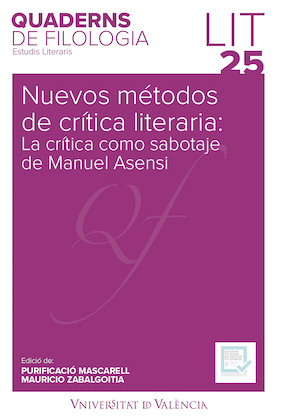When the signifier betrays the subject. Polyphony and sabotage in Tres almas para un corazón, a novel by Guillermina Mekuy Obono (2011)
DOI:
https://doi.org/10.7203/qdfed.25.18984Keywords:
postcolonialism, feminism, criticism such as sabotage, model of the world, Equatorial Guinea. Abstract
Abstract
This article analyzes Tres almas para un corazón (2011), a novel by the Guinean-Ecuadorian writer Guillermina Mekuy. The rightness of criticism as sabotage for this investigation resides in the analysis of the affective syllogism as the mode and origin of the world model of discourse, as well as the attention to the author, as a complex subject, responsible for that model.This novel is presented by its author as a feminist and decolonial practice. However, criticism as sabotage will show how such a perspective is diluted in the analysis of its significant materiality, where the modern/colonial gender world model is reaffirmed, a fact that contradicts the conscious motivation of the writer.
 Downloads
Downloads
Downloads
Published
How to Cite
-
Abstract452
-
PDF (Español)359
Issue
Section
License
 Este obra está bajo una licencia de Creative Commons Reconocimiento-NoComercial-SinObraDerivada 4.0 Internacional.
Este obra está bajo una licencia de Creative Commons Reconocimiento-NoComercial-SinObraDerivada 4.0 Internacional.
Authors who publish with this journal agree to the following terms:
- Authors retain copyright and grant the journal right of first publication with the work simultaneously licensed under a Creative Commons Attribution License that allows others to share the work with an acknowledgement of the work's authorship and initial publication in this journal.
- Authors are able to enter into separate, additional contractual arrangements for the non-exclusive distribution of the journal's published version of the work (e.g., post it to an institutional repository or publish it in a book), with an acknowledgement of its initial publication in this journal.
- Authors are permitted and encouraged to post their work online (e.g., in institutional repositories or on their website) prior to and during the submission process, as it can lead to productive exchanges, as well as earlier and greater citation of published work (See The Effect of Open Access).




